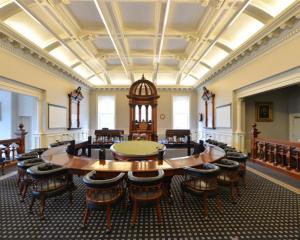It can have come as little surprise that economic development for Dunedin was the top priority in the annual Dunedin City Council survey of residents.
Hillside, New Zealand Post and possible Invermay job losses have had a telling impact.
While other jobs here and there are being created as well as lost, Dunedin is reminded again of its vulnerability and its reliance on the University of Otago.
Citizens might be happy with a stable city and might even reject the god of growth. But most are alert to the dangers of a downward spiral, and aware Dunedin requires a solid underpinning of employment.
They are willing to ''stand up'' to try to prevent the city's strengths from being undermined.
This impetus has focused on the massive and specific threat Invermay, in significant part because of the agricultural centre's role in research and the ''knowledge'' economy.
As manufacturing in the West, and especially far from large markets, is undercut by China and Third World wages, it has been increasingly recognised the future lies in specialised and high-value manufacturing and in creative and research businesses.
Because Invermay's core is research, the centralisation of most jobs there to Lincoln is especially galling and worrying.
Additionally, it is apparent - as in the original neurosurgery decision - the plan is unfair and based on reorganisation driven from the top by those with a bias towards building a centralised empire.
Thus, it is appropriate the community and local authorities appeal to AgResearch and to the Government as the primary funder of this type of research.
The Government has also been behind many of the other job losses, and it is a government agency that is, for example, proposing to centralise the production of main hospital meals in Christchurch.
The Government needs to know the anger and outrage in Dunedin as it abandons the city in these areas. The Government needs to play its part in Dunedin's future.
Nevertheless, the retention of such jobs is but one part of economic development and Dunedin's future. At the next level, the mayor and the council need to be accountable for their part.
It is fine for the council to point to its economic development unit and its work to convince Wellington politicians about government and quasi-government jobs. But just how supportive of business is the council from top to bottom?
Through planning, building permits, transport planning, rates and so on, is the council in fact business friendly?
Does what it provides impress possible immigrants to Dunedin? Does it and the city generally project the attitudes and produce the goods that make Dunedin an attractive place in which to live. The council must ''stand up'' for the city.
What, too, about the attitudes of business people, workers and residents in the South? Do we really want, in matters both large and small, to be efficient, effective and positive?
Is our customer service, as has been claimed, at best mediocre?
Would a new business really want to set up here when the attitudes around it are slack and making progress is much harder that it should be? Would residents want to live here because we are friendly, vibrant, proud, helpful?
Do high standards flow through our hospitals and in our schools? Can we show the rest of the country we are superior in what we do and how we do it? Business and residents must ''stand up'' for the city.
Dunedin has many inherent advantages, not least of which are relatively high education standards and relatively low numbers of social problems.
It has an intellectual, social, sporting and cultural life well beyond what might be expected in a small city. We also have companies blazing trails and quietly doing the business. This all needs to be built on and fostered.
Although we do not expect the Government wrongfully to strip away jobs, Dunedin as a community fundamentally has much of its future in our own hands.
The raw fact is that, in an intensely competitive world, Dunedin has to ''stand up'' for itself.












